VIDYABEN SHAH & MANUBHAI SHAH
Early Years
Early Years of Manubhai Shah
Manubhai was born in the village of Wadhwan (present day Surendranagar in Gujarat), a British Camp as the third of ten children to Mansukhlal, a Thanedaar in charge of 101 villages, and Iccha Baa. Though he came to be known as Manubhai, at birth his family had named him Manhar (the one who wins minds), a name he carried in spirit throughout his life as he won the minds of people he met in any walk of life through his kindness, generosity and sharp intellect. He always had a smile on his face and impressed people with his meticulous recall of relevant facts and figures.
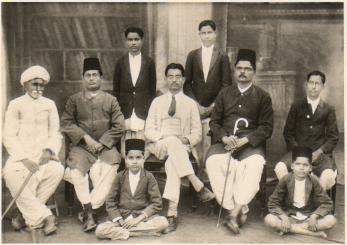
Manubhai's paternal grandfather was Maneklal Shah, a school teacher who taught Mohandas Karamchand Gandhi for many years from primary to high school years, also giving him private coaching as Gandhi was having difficulty with his studies. This student of Maneklalbapa is to become the father of the nation Mahatma Gandhi in the years to come. In the gigantic turn of events, Manubhai was to later become associated with Mahatma Gandhi when in 1932 he joined the Indian movement for independence against the British. Manubhai went to jail for 3 years for his participation in the Quit India Movement. (Manubhai's maternal uncle Popatlal Girdharlal Chhaganlal Shah was also active in the Freedom Movement and was imprisoned along with stalwarts such as Former Prime Minister of India Shri Morarji Desai who remained Popatmama's lifelong friend.)
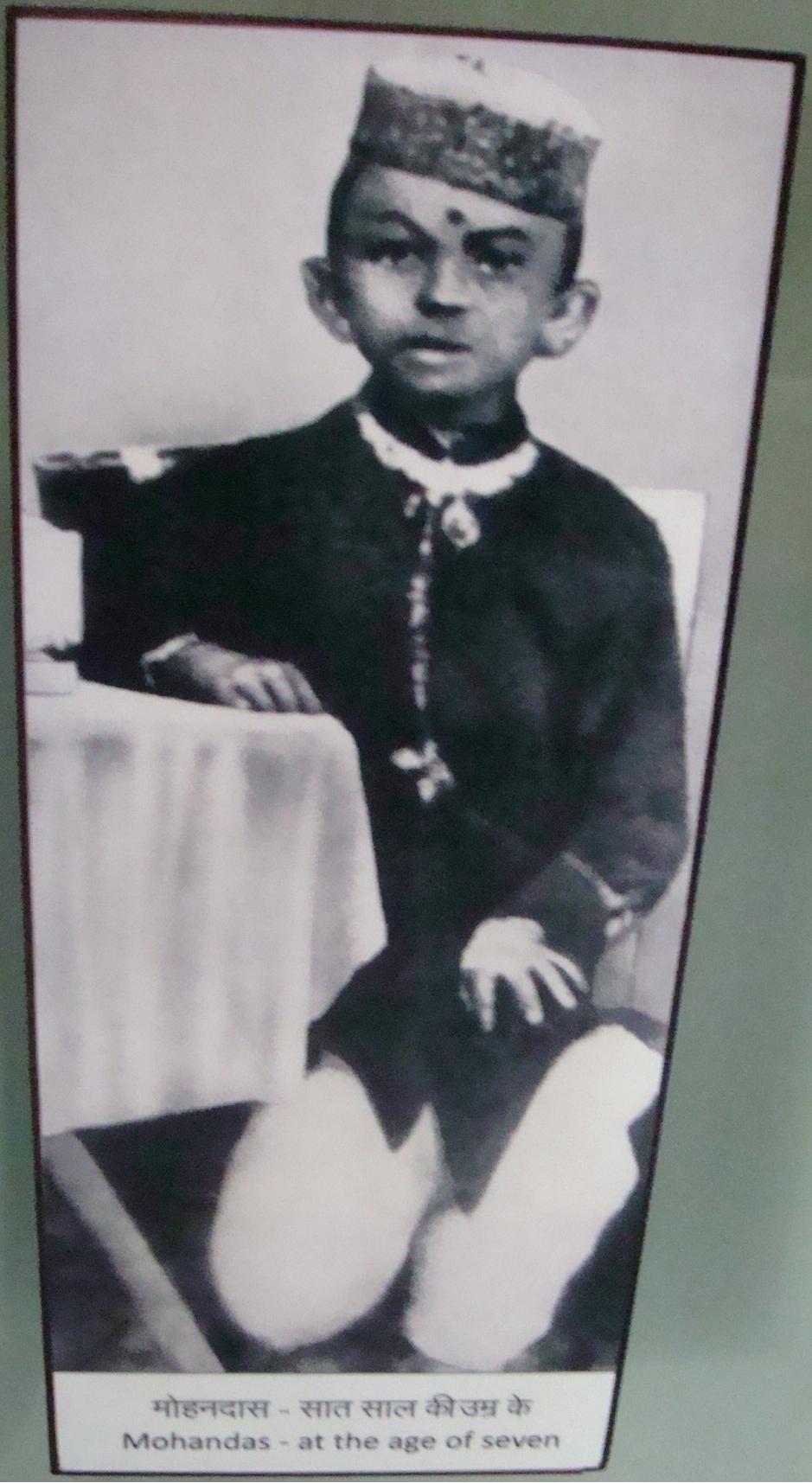
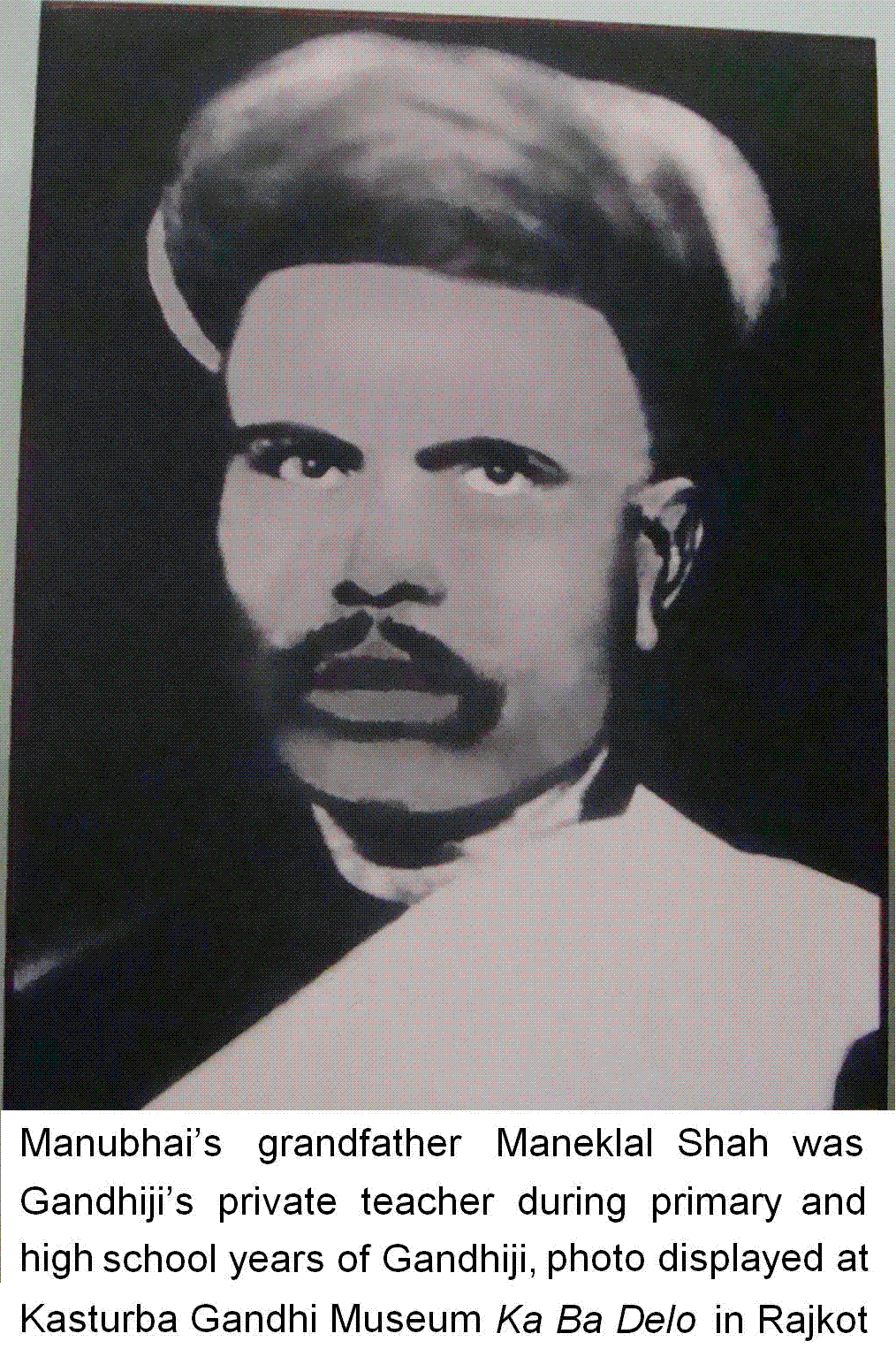
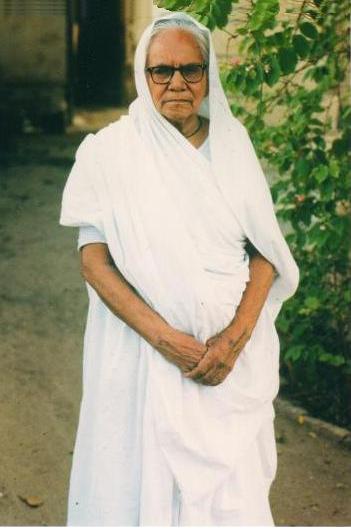
The Mansukhlal Shah family with ten children and one adopted child, daughter of Mansukhlal’s brother, was large with modest means but was managed efficiently by Ichha Baa who was a feisty lady of high thinking and great principles and spirits. She worked tirelessly for the welfare of women and remained President of Stree Pragati Mandal (Centre for Empowerment of Women) throughout her life. Like many women of her generation, she only wore a white or grey khadi saree since the 1930s till her death in 1983 at the age of 90. Mansukhlal was of enlightened views and if the women in the family tried to knead the dough at home to make paapad, he was known to throw the dough away saying the family wives were already overburdened with domestic and other duties and women from poorer families needed to earn a living by selling paapad and should be given an opportunity to make them and sell them for profit. Manubhai inherited many of the values of fairness, equality and justice from his parents displaying these principles throughout his career as statesman and politician.
Having had his primary education in Wadhwan (Gujarat) in Gujarati medium of instruction, Manubhai then studied for a few years at NTM High School in Wadhwan in English medium. He completed his matriculation examination (year 10 of school) in the town of Lakhtar (Gujarat) living with his maternal uncle Popatmama as at that time his father was posted as Thanedaar in a village where there was no high school. Manubhai’s maternal uncle Popatmama was a Station Master in Lakhtar. On one of his frequent visits to the Station, Manubhai once used a pen and ink of the Station to leave a note for his uncle. Before he completed writing the note, his uncle arrived. On seeing that Manubhai was using pen and ink which was Government property, Popatmama slapped Manubhai and scolded him for utilising the ink which did not belong to him. This incident and other characteristics of his uncle stayed in Manubhai's mind for ever. Each year it was routine for the British goverment to provide woollen jackets and coats to their employees. After Popatmama received his first set of woollen clothes, in the following years he refused to accept any new set saying he had already got woollens from a previous year. Such was the high integrity in the family which Manubhai imbibed in his early years of life. (These principles were to remain with Manubhai throughout his life. As Union Minister in Delhi, Manubhai had access to a Government vehicle for use in his official duties. Once Manubhai’s wife Vidyaben had to go to the Railway Station to receive her elderly parents but their personal car was not back from the garage where it was being repaired. In this emergency situation Vidyaben used the official car for which she paid back 12 anaas (75 paise) per mile to the government.)
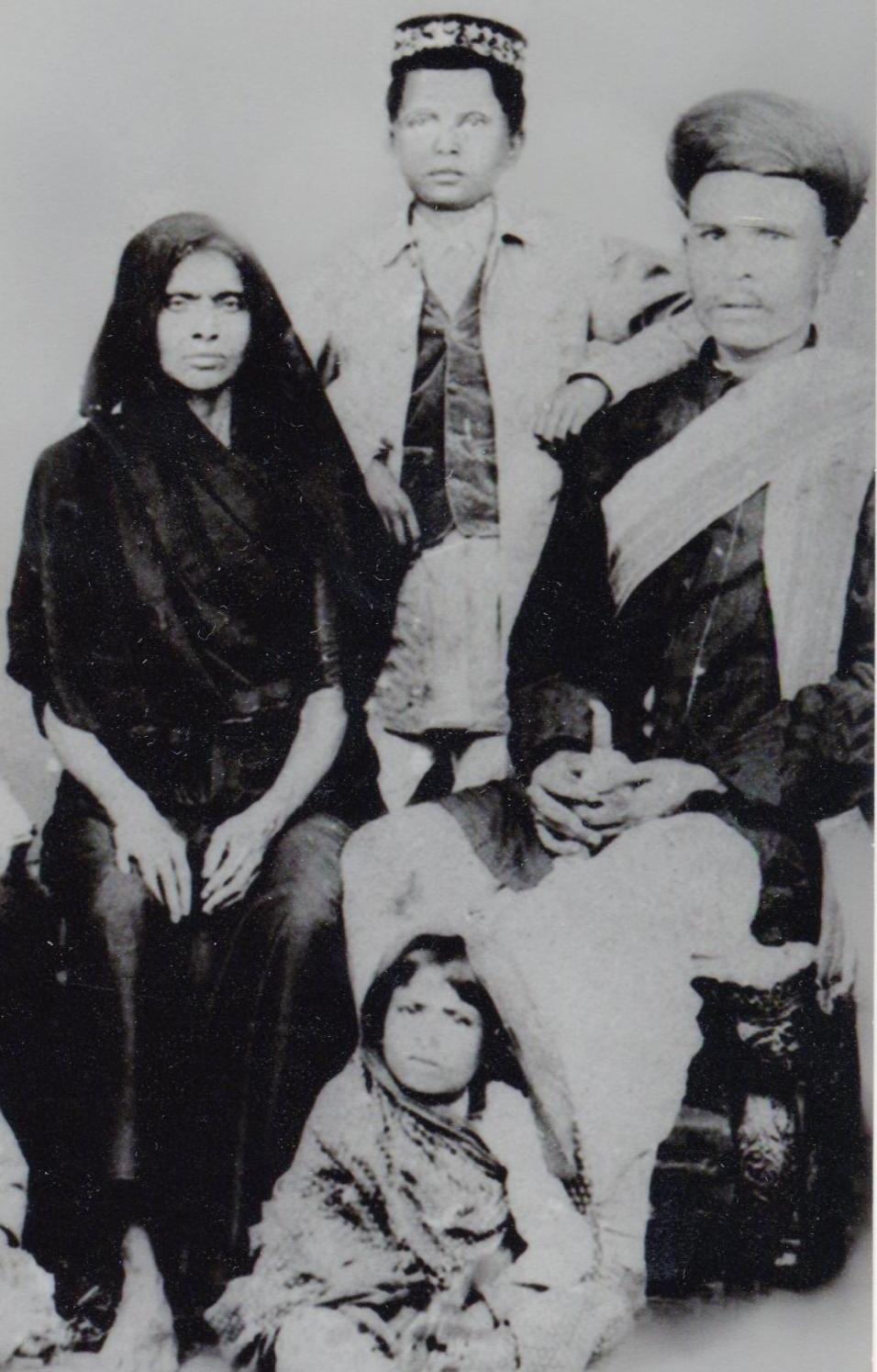
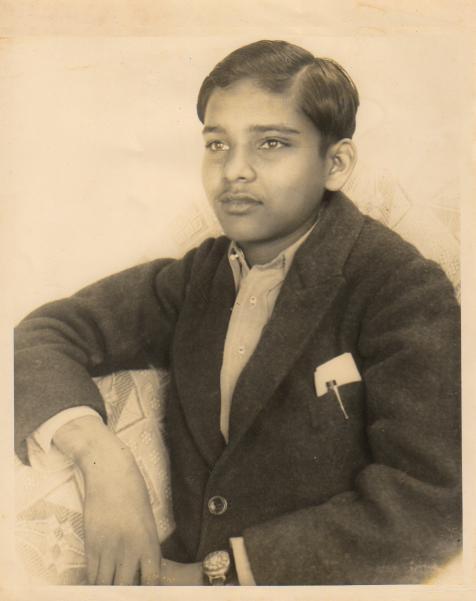
Manubhai's acts of honesty as a politician, policy maker and administrator are legendary. He did not allow his sister’s husband Dr Rasiklal Kamdar who was a medical surgeon to be posted as the Chief Surgeon to the Government Hospital in Bhavnagar in erstwhile Saurashtra in case the decision of the Board could be influenced by Manubhai’s position as Minister in the Saurashtra Government. He did not permit his wife’s brother Chandrakant Mehta who was a chartered accountant to audit companies which may have needed any kind of official action from Manubhai in his capacity as Union Minister. One example had become very famous in the 1950s when Manubhai requested his wife not to accept donation for Triveni Kala Sangam an arts institution she was involved in building in Delhi; the interested donor was SASMIRA an independent research association of the silk industry which was likely to require Manubhai’s assistance as he was the Minister in charge of textiles at the time. Another well known incident is where he had made a large purchase for his employer the Delhi Cloth Mills, and the supplier of the items asked him how his personal commission should be paid, to which his reply was that any amount that the supplier would consider as payment for his services should be deducted from the total bill as the employer already paid him a monthly salary for his services. After joining the Union Council of Ministers in Delhi in 1956, Manubhai started contributing 50 percent of his salary to the National Defense Fund. This was unthinkable even in those days. After a short period, family members persuaded him to withdraw this gesture towards his country which was very dear to him. In the mid 1960s, one of his erstwhile colleagues from the previous Saurashtra State Government was in a financial crisis and approached Manubhai for support. Manubhai immediately offered financial assistance and continued his support for several years. He would never say no to anyone reaching out to him. Throughout his working years, he extended financial help to his brothers and sisters and their families whenever it was needed. When his elder brother was living with him in Delhi, in keeping with the principles of the family, the salary would be handed to the brother as he was the elder in the house and he would handle the day to day expenses. Such were the teachings of generosity of the ancestors of the families of Vidyaben and Manubhai.
After completing his intermediate from Samaldas College in Bhavnagar, Gujarat, Manubhai obtained a B. Sc. (Honours) degree from Baroda College of Science (present day Maharaja Sayajirao University of Baroda). He studied chemical engineering in Mumbai at University of Mumbai’s University Department of Chemical Technology (UDCT) (present day Institute of Chemical Technology) and received a B. Tech. degree in 1937 funding his way through by teaching
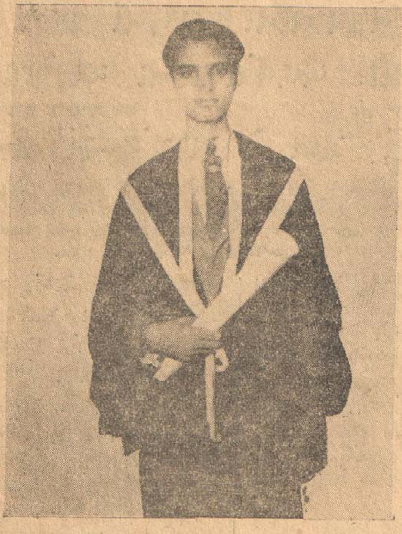
Manubhai felicitated as UDCT Diamond in 1994
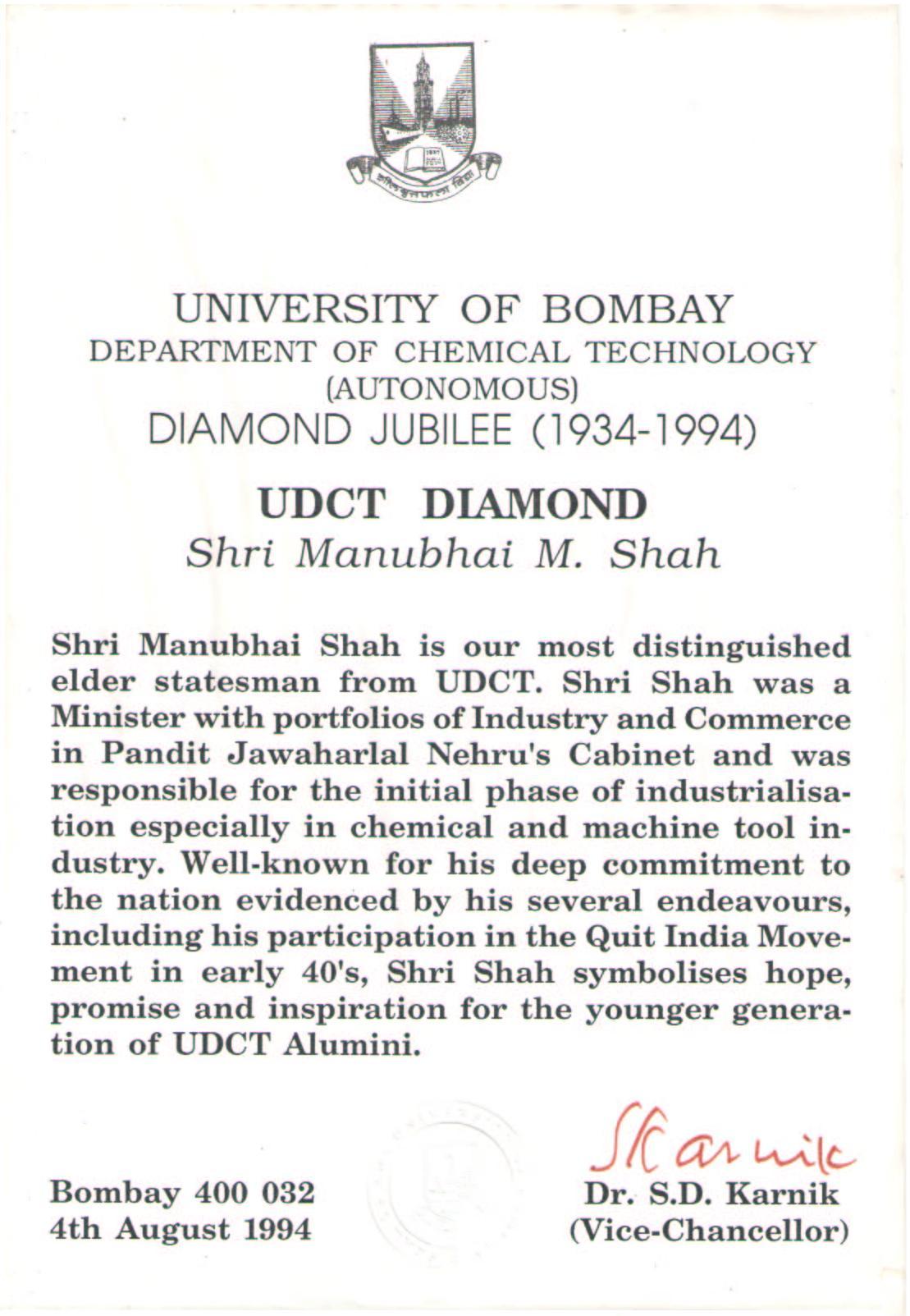
Manubhai was a natural and brilliant mathematician and had been looking for funding to enable him to go to Cambridge University to obtain a tripos in mathematics. But in 1936, when Manubhai was studying at the UDCT in Mumbai, Sir Lala Shri Ram (Lalaji) of the Delhi Cloth Mills (DCM), one of the largest textile businesses in India, arrived at the UDCT on a recruitment mission and interviewed Manubhai for a post of textile engineer at DCM. After an hour long interview, Manubhai declined to go to Delhi as he had ideas to study further. Lalaji however kept up his efforts to recruit Manubhai through the then UDCT Director Dr R B Foster. After persistent attempts Dr Foster persuaded Manubhai who relented and joined DCM in 1937. Immediately on joining Manubhai displayed his entrepreneurial abilities and sharp intelligence, and won the heart of Lala Shri Ram. Manubhai's exemplary hard work, utter honesty and diligence became a talk of the town and he already started to envision an industrial revolution in India. Lalaji gave him a free hand and Manubhai introduced many innovative ideas in the DCM group of companies. Having thoroughly researched and deeply understood the chemical and other processes of textile and garment production from raw material to yarn to looms to garment making, he contributed to the setting up of a research unit which was the forerunner to what is now the Shriram Institute for Industrial Research and several modern units of production and exports including exports of USHA machines which has since been an international brand of sewing machines.
Lalaji trusted Manubhai deeply and treated him like a son. Bharat Ram and Charat Ram were like his brothers. Shiela Bharat Ram discussed many ideas with Vidyaben on setting up cultural institutions in Delhi (later Vidyaben became President of the Indian National Theatre started by Shielaji.) Very soon the entire Shri Ram family became very close to the Shah family and even after Manubhai left DCM to join politics and the Congress party, the Shri Ram family visited them in Gujarat and continued to maintain close family relations when the Shahs returned to Delhi in 1956. The Shah family and Shri Ram family met very often at the Chhoti Kothi at 22 Curzon Road (now Kasturba Gandhi Marg).
Lalaji's eldest son was Murli Dhar, whose daughter in law Prabha Sridhar recounts an incident when in the 1960s her husband Sridhar was developing a needle bearings industry project. Sridhar was looking for foreign collaboration and came back with a contract with a USA based company and sought Lalaji's opinion to decide whether to accept the contract or not. This was around late November time somewhat cold in Delhi in those days. Lalaji immediately said, "Go and ask Manu, he will be the best person to advise." Sridhar called Manubhai who said, "Sure come along. why delay, I will wait for you at 5.30 tomorrow morning." And Sridhar went to see Manubhai at 5.30 a.m. on a late November morning, and they talked as Manubhai took his morning walk outside his residence in Delhi. He saw the papers there and then and gave an immediate decision. This speed of work was to stay with Manubhai throughout his life. Once indirectly through writing a newspaper article he conveyed to Lalaji that Lalaji’s employees were not trained or paid well, at which point Lalaji himself requested Manubhai to start a training scheme for DCM employees, which he promptly did. Manubhai was also generous and caring towards his fellow employees, a trait which made Lalaji appoint him as Chairman of the first ever in the county, DCM Employees’ Welfare Benefit Fund which also encouraged labour participation in management. Lalaji was in the process of offering Manubhai a partnership in DCM when suddenly in early 1948 a few months after Indian independence, Manubhai’s career with DCM came to an end with another call for country.
Early Years of Vidyaben Shah
Vidyaben was born in the town of Jetpur (Gujarat), as the third of six children to educationist Vrajlal Mehta and Champaben Modi. Vrajlal was a school teacher at the time, later becoming principal of a teacher training college, and subsequently Director of Education in Saurashtra State Government. Between the age of 7 and 14 years, during her summer holidays Vidyaben used to live with her grandparents (travelling partly by bullock cart) at first in Thapla village (Junagadh District) and then in Khodu village (Surendranagar District) where she used to attend school with the local children and work with them in separating cotton fibre from cotton seeds and earning money by selling the cotton by weight. She would then give the money she had earned to the local children. The habit of generosity was inculcated in her during those early years, as also a deep sense of belonging and desire to work in rural areas.
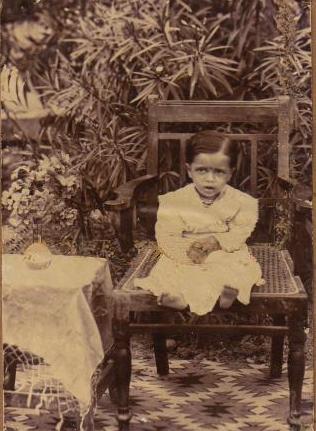
Being the only daughter, Vidyaben was always supported by her parents and five brothers, and she excelled in studies at school and college. In early childhood, she was a quiet child and relatives would comment that she was aphonic. She grew up to sing beautifully. Also, she was to speak voluminously during India's Freedom Movement. Subsequently in independent India in her extensive work with children and women she gave lengthy extemporaneous speeches on the care of children, on the emboldenment of underprivileged women, and on the necessity to be tenderly mindful of the needs of the elderly. She was never silent; she was only in preparation towards a future where she was heard by thousands who among others benefitted greatly from her utterances.
During her school years, at the very young age of 11, Vidyaben was already greatly influenced by the work of Gandhiji. As a high school student, she had created a stir in her school by bringing the message of non‑violence to her fellow students. In 1938, when Vidyaben was 16 years old, the Indian Red Cross Society had been active in India having been founded in the 1920s. Vidyaben was drawn to the work of the Red Cross and on Red Cross Day in 1938 she participated in the local events. At that point in time she convinced the Red Cross Society to allow her to gather funds for the health of women from economically weaker sections of society. The Society readily agreed and Vidyaben went from door to door collecting donations. Using these funds she began to help women, especially pregnant women and new mothers who did not get adequate nutrition in their families. With help from the Red Cross Society, she opened a centre in Rajkot where women would come during early morning hours and she would give them nutritional food and advice on looking after their own health as well as their infant's health. She would also give them advice on hygiene and cleanliness regarding young children and on how to keep their homes clean.
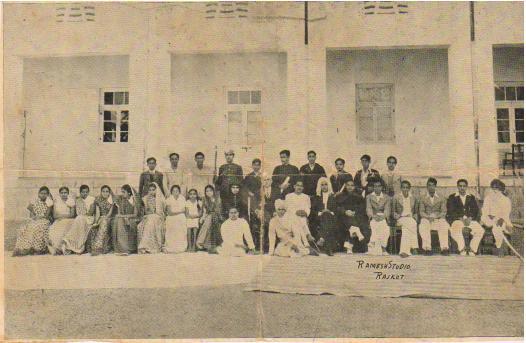
Shortly thereafter, when she was a university student she participated in the Quit India Movement under the guidance of Gandhiji. After completing B.A. in Economics in 1943 from Dharmendra Sinhji College in Rajkot, as there was no postgraduate college in her parents' town, she left home to study for an M.A. from Samaldas College in Bhavnagar. While studying in Rajkot and Bhavnagar, she was already an active social worker. In Bhavnagar she was staying in a women’s hostel and had taken on the task of looking after the welfare of young girls who came from East Africa to study in India. She would take care of them when they were ill, provide them extra food as hostel meals were meagre.
Since 1938, Vidyaben has been one of India's leading activists in the field of child welfare and women's rights. In 1948, Vidyaben had initiated a pioneering institution called Refugee Women's Centre in Sadar, Rajkot for the welfare of refugee women and girls who had been displaced at the time of Partition of India. Their activities included fulfilling government orders for bulk printing of stationery and documents which at the time was considered revolutionary and highly empowering for women. Vidyaben has been associated with a large number of organisations working for child welfare, education, women and family welfare, civic administration, fine arts and culture, welfare of the disabled, senior citizens and many other social and relief work activities. She has also received numerous awards for her distinguished work, including the Padma Shri by the Government of India in 1992.
In 1940 at a chance meeting at a social function Manubhai met Vidyaben. Though he was a Jhalawadi and she a Kathiawadi, with each community often heard to be critical of one another (!!), and he a Jain and she from a Vaishnav background, they had much in common intellectually and both were also actively involved in the Freedom Movement. Shortly thereafter they fell in love and decided to get married. But marriage had to be delayed by five years as the freedom struggle was gaining momentum and their involvement in the Movement became more intense. Manubhai was imprisoned by the British Colonial Authority in 1942 for three years, being released from Ferozpur jail in 1945.
In a simple ceremony Manubhai married Vidyaben in 1945 in Surendranagar (Gujarat) at the NTM High School grounds requesting her to bring with her only two pairs of clothes. The marriage ceremony was so simple that the bride and groom wore plain cotton khadi clothes and for wedding gift Manubhai gave Vidyaben only one khadi saree which he had himself woven on a handloom using cotton yarn which he had himself handspun on a charkha (spinning wheel) while in prison during the Freedom Movement.
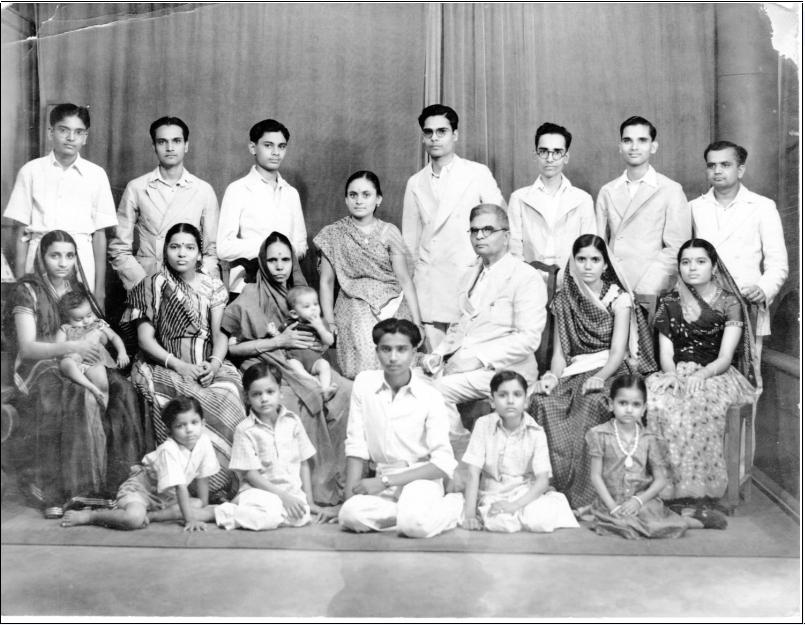
On the day of the marriage, Vidyaben’s family suddenly saw that Manubhai had arrived alone to get married. Upon enquiry, Vidyaben’s family learned that Manubhai waited for his family members to get ready for the ‘barat‘, but since they were taking longer than what Manubhai was used to, he had left his home and instead of taking a conveyance, had walked to the marriage venue all by himself. People were quite familiar with Manubhai’s speed of action, but in this instance the speed appeared to be
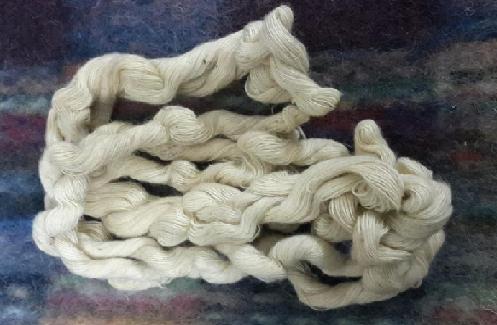
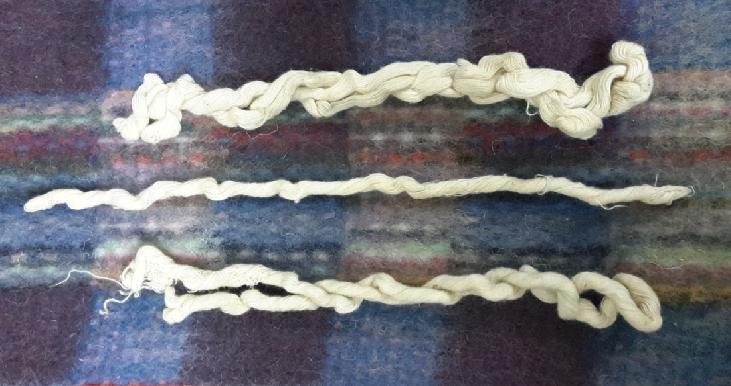
While being activists and working for society, Vidyaben and Manubhai did not ignore their duties to the family, and the large extended family was always invited to their home, sometimes with fifty people living under one roof for several months at a time, with Vidyaben kneading a gigantic dough to make chapati for fifty family members for each of the two meals a day. Vidyaben and Manubhai have one daughter, three sons, three granddaughters, one grandson and two great grand daughters. Their son Dr Arun Shah
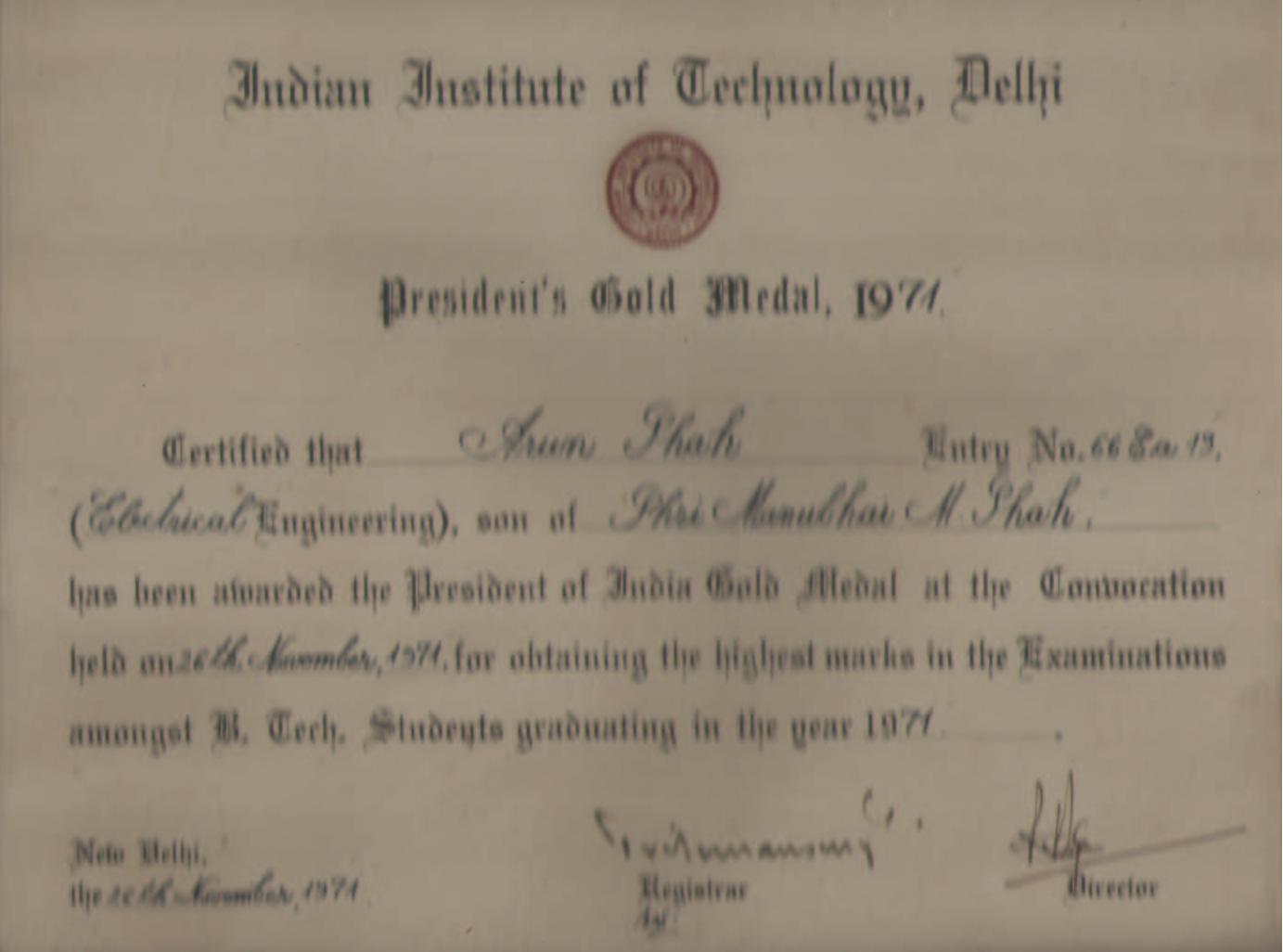
Vidyaben raised the children with greater concern for morals and the right values rather than with emphasis on excellence in academics. Apart from imbibing the family values of humility, Arun was a gifted child and throughout his life he was a gold medalist in his studies. He was also a chess and bridge champion having devised a complex digital chess game for players to compete with on a computer; a mountaineer having climbed the Kilimanjaro and the Machu Pichhu; and an avid marathon runner. Their youngest son Dr Mihir Shah was Member of Planning Commission of India from 2009 to 2014 and currently runs the NGO Samaj Pragati Sahayog (SPS) in Madhya Pradesh. SPS has set up a first of its kind training programme in India in watershed management; people from across the country have been receiving training there benefitting lakhs of people.
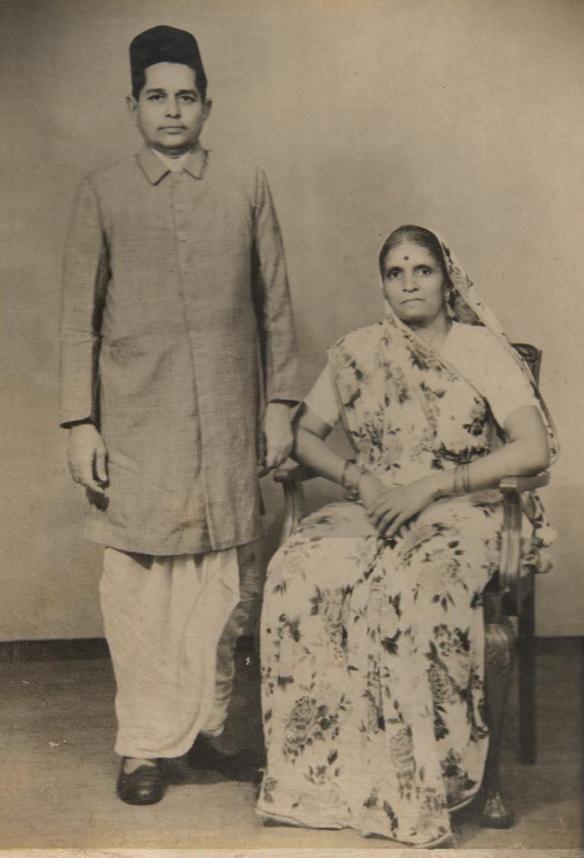
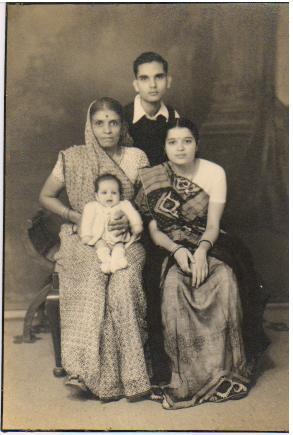
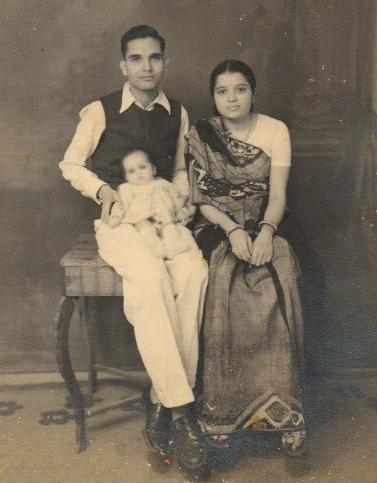
Culture, Civics, Institutions What people said